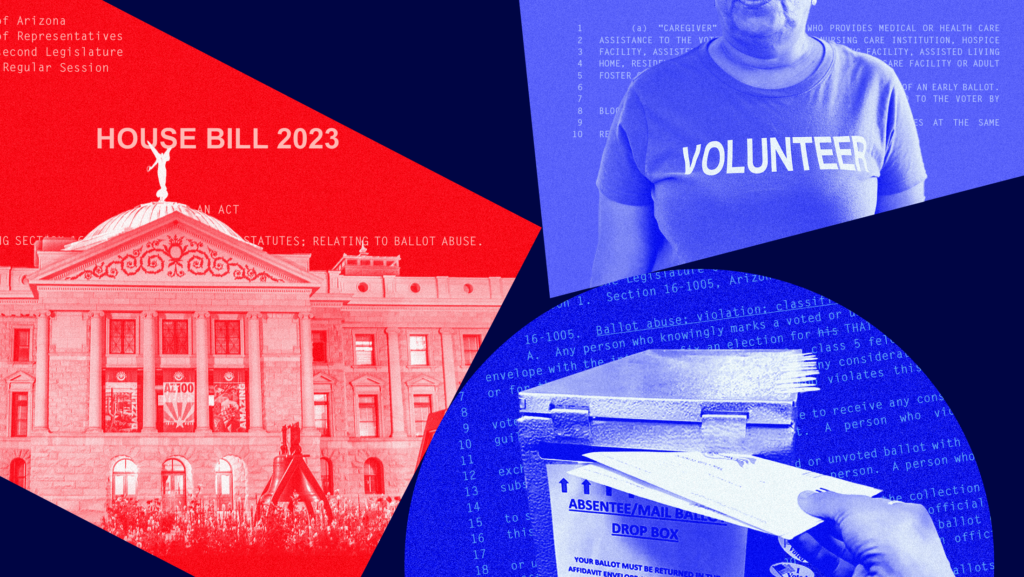“The Goal Is to Confuse:” How Arizona’s Ballot Collection Ban Harms Voters

“I don’t have a ride. I don’t have a way of getting my ballot to my polling location. Can you help?”
That was the common question Carolina Rodriguez-Greer would hear from Arizonans seeking assistance ahead of an election. Rodriguez-Greer, the Arizona State Director at Mi Familia Vota, volunteered with the organization for years, collecting mail-in ballots from individuals who were otherwise unable to mail or drop off their ballots.
“I couldn’t tell you how many houses I drove to,” Rodriguez-Greer told Democracy Docket, “but I can tell you that at every single house that I went to, [I saw] the people’s relief, people’s excitement to know that a trusted organization was going to make sure that their ballot made it to the finish line and their voice was going to be heard…Folks are eager to participate and want barriers removed.”
The relief and excitement is no longer possible. In 2016, Arizona outlawed the type of third-party ballot collection Rodriguez-Greer and Mi Familia Vota engaged in. Community ballot collection or third-party ballot collection is when a designated individual collects and returns a completed ballot on another voter’s behalf. Arizona’s law made it a felony to return someone else’s signed and sealed ballot, with very limited exemptions for relatives, caregivers and household members.
Democratic groups challenged Arizona’s criminalization of ballot collection in court. The full 9th U.S. Circuit Court of Appeals struck down the ban for violating the Voting Rights Act, finding that “racial discrimination was a motivating factor” in the law’s enactment. The U.S. Supreme Court ultimately reversed that decision and reinstated the law in Brnovich v. Democratic National Committee (2021).
“At the time, we stood alongside voting rights advocates who warned about not only the potential for inconsistent enforcement of this law, but the real chilling effect it could have on our communities,” Arizona Democratic Party Chair Yolanda Bejarano explained in a comment to Democracy Docket, referencing concern that arose back when the law was originally passed. “We understood then and now that this was a disgraceful voter suppression attempt that uses fear and intimidation to hurt our most vulnerable communities.”
In October 2022, the first two people were sentenced under the 2016 law: a community leader and her neighbor in a small town without mail delivery. The town, San Luis, sits on the U.S.-Mexico border and is home to a population that is around 95% Latino.
To prevent voters, especially those helping their communities, from serving future jail time, every state should make ballot collection legal.
In Arizona, ballot collection represents the perfect storm of colliding issues: the Republican Party’s sharp reversal on mail-in voting, propaganda movies about drop boxes and discrimination against the state’s growing Latino population.
The Grand Canyon State has offered no-excuse mail-in voting since 1991 and it’s immensely popular in the state. In fact, in 2020, nearly 90% of voters took advantage of early voting, the majority by mail. Yet, Arizona Republicans have tried — in the Legislature and in the courts — to revoke this voting method.
One component of mail-in voting is ballot collection and drop box use. Ahead of the 2022 midterms, right-wing groups called upon their volunteers to monitor drop boxes for “mules,” a term from the debunked “2000 Mules” propaganda movie to describe a shadowy group of individuals who collect fraudulent mail-in ballots and return them to drop boxes. (San Luis was one of the examples highlighted in the film.)
In Arizona, the term “mule” also has particularly racialized undertones, with the state’s 2016 ban initially overturned because a court found it had been passed with discriminatory intent. In legislative hearings, a video showed an apparently Latino man lawfully returning numerous mail-in ballots to an elections office. The video’s creator, the former head of the Maricopa County Republican Party, added commentary that he “did not know if the person was an illegal alien, a dreamer, or citizen, but knew that he was a thug.”
While over 30 states have some form of guidelines on ballot collection, in light of 2020 election-related conspiracies, there has been a bigger push from the right to curtail “ballot harvesting,” the pejorative label for this often benign practice.
According to Voting Rights Lab and Democracy Docket’s tracking, as of Monday, March 13, there are 27 bills introduced in 12 states that aim to restrict ballot collection; this includes 18 bills that would limit who can return a completed mail-in ballot, six bills that would reduce the number of ballots a designated bearer can return and three bills that would increase penalties on violators.
Among these proposals, four bills in Arizona are seeking to make the pre-existing law even more prohibitive by removing the family or household member exception, adding ID requirements and more. In contrast, Arizona Democrats have introduced a bill to repeal the near-ban. When asked about the ongoing impact of the state’s strict rule, Rodriguez-Greer expressed: “What it does is it’s sending a really strong message around: Don’t even bother.”
She added that her organization is doing extra work educating voters on existing laws, which can be difficult for the large majority of people who don’t actively keep up with legal changes. “It’s really a shame that without this being an issue — there is no data saying that this has been an issue — [the state has] spent so much time, energy and taxpayer dollars to to confuse current and future voters,” Rodriguez-Greer continued, ultimately concluding: “The goal is to confuse, the goal is to put fear in people.”